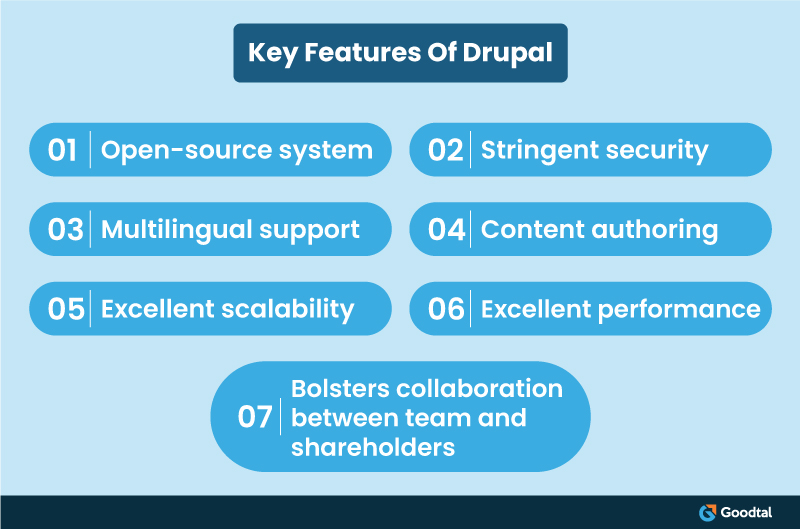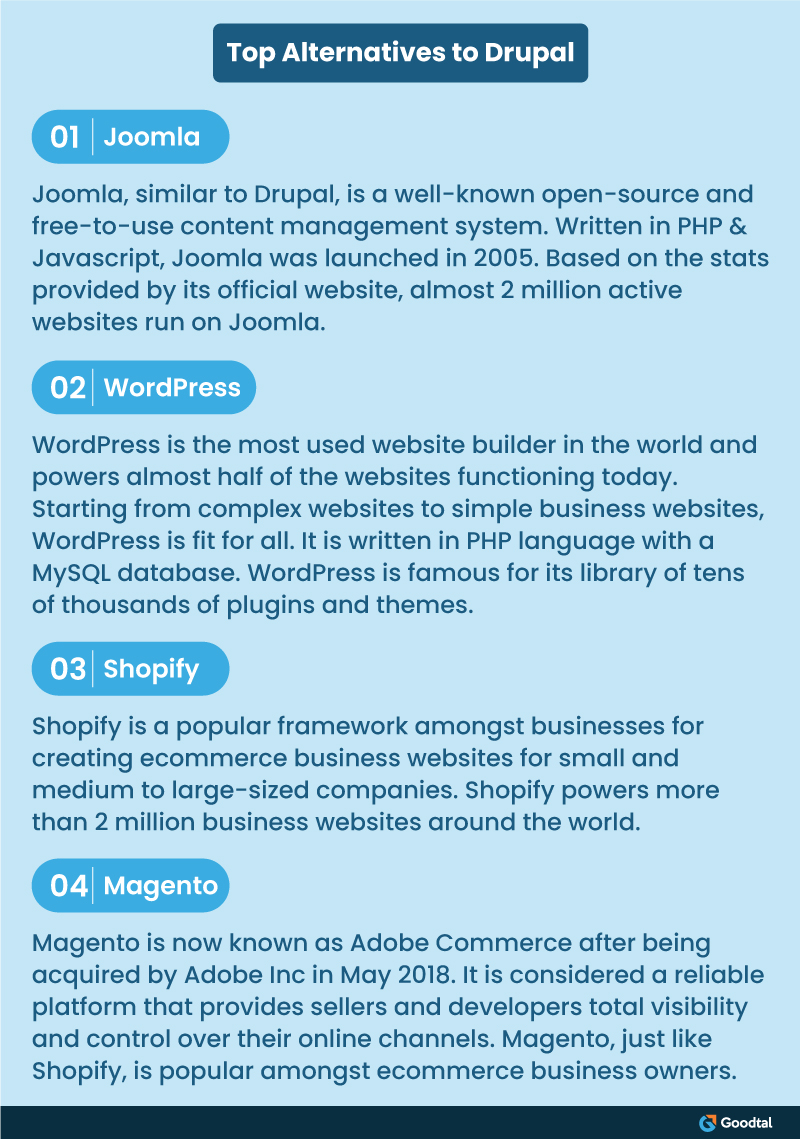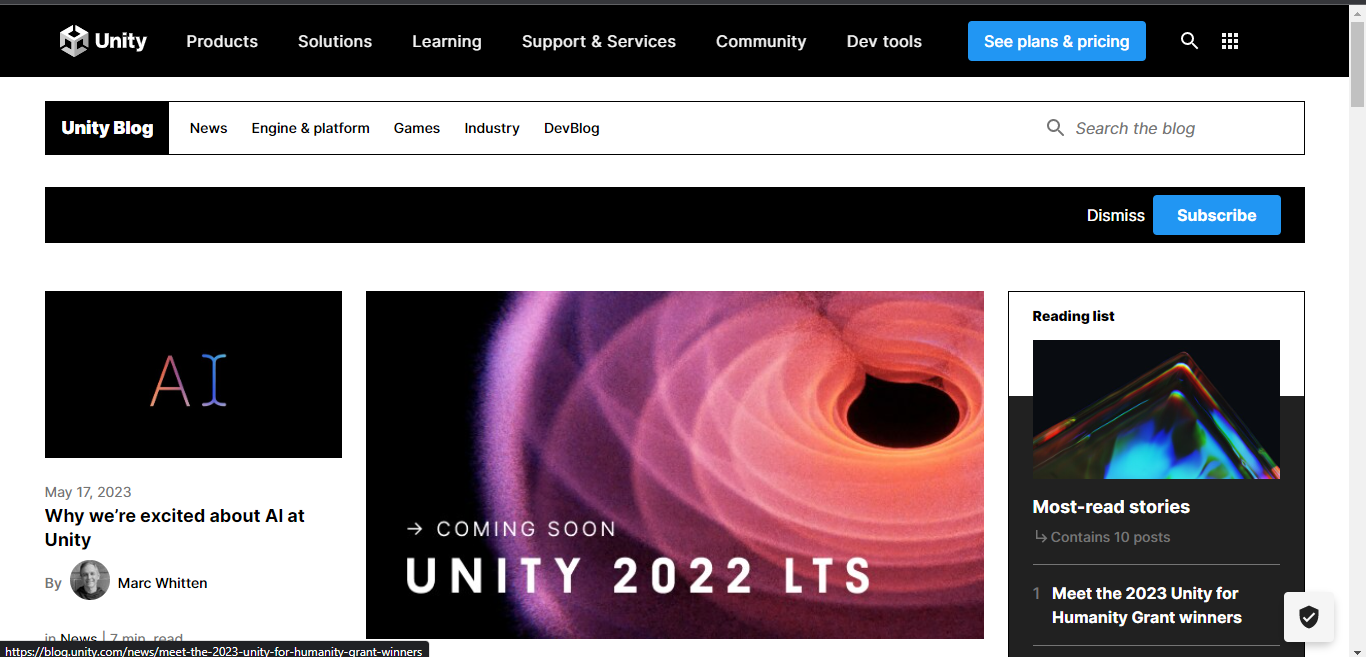
Are you looking for a website developer with a limited budget and no time to spare?
Then Drupal developers can be your best chance to get your dream website built and deployed in the shortest time and lowest budget possible. But before choosing a particular developer and web development company, knowing what exactly Drupal is and its key features is essential.
Drupal is a very successful content management system used widely by some of the best web developers around the world. It allows developers to build and manage a website cost-effectively in minimal time.
In this post, we will discuss Drupal and try to learn some of its key features. We will also look at some of its key alternatives that businesses can consider.
But before moving to our key focus, let's start with a brief overview of web development.
A Brief Overview of Web Development
In the 21st century, Internet has reached almost every nook and cranny of this world. Everybody is connected to the Internet no matter what part of the world they are living in, from deserts to the middle of the ocean.
In such times not having an online presence can be catastrophic for businesses. Websites are one of the most common and affordable ways for companies to mark their online presence.
The demand for web development is on the rise following the growing necessity of owning a business website. Web development, just like any software development project, is a complex and time-consuming task. But with the availability of some robust content management systems (CMS) in the market, the task is becoming simpler and less time-consuming.
Drupal is one such CMS that has made web development much more convenient for millions of developers around the world. Let's move forward and learn what Drupal is all about.
What is Drupal?
Drupal is very popular in the web development industry due to its easy-to-use interface and excellent features.
Drupal is categorized under the class of content management systems. Content management systems are a type of software that allows developers to create, deploy, modify, store, and manage a website and its content from one place.
Drupal is an open-source software distributed under GNU General Public License. It is a free-to-use system and hence doesn't require any installation charges. Based on Drupal's official website, at least 840,170 websites use Drupal or any of its versions.
Now, let's dive deeper and learn more about the features of Drupal.
Suggested Reading: CMS 101: All You Need to Know
Key Features of Drupal
Drupal is popular amongst web developers because of its rich set of features and the extensive range of modules and templates that the system provides.

#1 Open-Source System/Better Collaboration
Drupal is an open-source system that makes it easily shareable with others. Due to the open-source nature of this system, anybody can download it without any licensing fee, unlike closed-source systems where the codebase of the program is not visible or, say, accessible to others.
Open-source software makes collaborating on the same project easier for various teams. Hence with better collaboration provision, open-source software makes it easier for teams to synchronize their tasks better no matter what country they are working from.
#2 Robust Security
Drupal is considered a CMS with the best and most robust security. Drupal considers its open-source nature as one of the key reasons behind its impeccable security.
The team of Drupal is spread globally, working 24/7 to monitor the system for any security vulnerabilities. Teams ensure that no error or security vulnerabilities cause hindrances to client projects. Thus ensuring that any security threat is averted at the earliest.
#3 Multilingual
Drupal provides multilingual support to web developers, allowing them to open their websites to a wide range of people from different demographics. Drupal provides four built-in multilingual support modules which can be easily enabled on your website.
Once enabled, you can configure these modules on your website based on your needs. For example, assume you wish for your website to be available in Spanish, German, French, Japanese, and Chinese, along with English. You must add all five languages by visiting the "add languages" option in the configuration tab.
You can also select your default language in which the website will first appear to the visitors. After that, you have to add a language switcher tab on your website to allow visitors to switch to their desired language.
This way, Drupal provides web developers a convenient way to make their sites multilingual and accessible to a broader audience.
#4 Multi-User Workspace
Easier collaboration and work synchronization between various teams working on a project is crucial for faster project completion. In the same way, during web development, it is essential that all the teams collaborate and synchronize their work to ensure faster development.
Drupal ensures that teams can collaborate better by bringing in a workspace where multiple users can collaborate, build and edit each other's work.
Moreover, when your site is public, and you wish to create a space for the entire site users' community. Drupal's pro-collaboration workspace can help you build a blog like Medium or Wiki and allow site users to publish content or reflect on each other's work.
Most of the present CMS allows users to suggest edits, but I can hardly find one that allows site users to create their blogs. Hence the pro-collaboration workspace brings a lot of opportunities for in-house web developers as well as site users.
#5 Content Authoring
Drupal's content authoring environment provides content curators with a one-stop platform to create, edit, and review content before publishing. WYSIWYG editor allows content creators to use a range of typographies and tools, like bold, italic, etc., to create visually strong content.
WYSIWYG is an acronym for "what you see is what you get." This type of editor allows you to edit in the same format or layout as it will appear on the webpage. You can make the changes and see those changes in effect in real time on your websites.
This editor has a highly convenient user interface; users do not need to add commands or have programming knowledge to use it. They can make changes using English or any other language like they would while writing on Microsoft Word or Google Docs.
#6 Excellent Performance and Scalability
A website load time or speed is a crucial factor that highly affects visitor experience, your website quality, and hence the SERP ranking. Nobody wants to stay or revisit a site that takes a very long time to load. The shorter the site load time or higher the site speed better will be the visitor experience and the higher the chances of lead conversion.
If you are a business looking for a website with great speed, Drupal can be your ideal solution.
Integrating Drupal's CDN (content delivery network) on your website can help you deliver excellent website performance and minimize load time.
CDN is a distributed network consisting of servers that undertake the task of distributing content from the main server to the end users. CDN improves the load time by caching content near the end user so that it loads faster when they are trying to access the website.
Along with better performance, Drupal makes your websites highly scalable, too, by making your websites fit to handle the overload. By overload, I mean to say a scenario where a large number of people are trying to access the website at the same time. The load time increases at such times, and in worst cases, the entire server crashes. But your site can become highly scalable with Drupal's horizontal and vertical server scaling along with the powerful CDN.
Top Alternatives to Drupal

Suggested Reading: Expert Tips for Selecting the Best Web Developers for Your Project
Drupal Use Cases
#1 United Nations Development Programme (UNDP)
UNDP wanted to relaunch its worldwide website in three languages, namely, English, Spanish, and French. Along with this, they also wanted to move more than 200 websites with a range of multilingual pages to a content management system that is scalable, responsive and helps them achieve great performance.
To fulfill UNDPs requirements, the outsourced web development company chose Drupal.

#2 Unity Technologies Blogs
Unity Technologies is a famous video gaming software development company headquartered in San Francisco, USA. Unity engines are the key engine powering the world-famous game Pokemon Go.
Their blog was built on WordPress, but they wanted to move to a CMS that could help them manage their content better, allow fast iterations, and provide unique API capabilities. Finally, the website was migrated to Drupal.

Businesses looking to outsource web development to reliable Drupal developers must go through Goodtal’s list of top Drupal developers around the world.
Wrapping Up
Drupal is a top-rated and leading content management system web developers use worldwide. Drupal powers some top websites worldwide, such as BBC and NBC. Drupal provides some of the best built-in features and module support, such as CDN, multilingual support, etc., that enable web developers and content curators to build a great website with a robust UI.
In this post, we discussed some of the key features of Drupal which every business and techies must know. We also discussed some of the limitations of Drupal and its top alternatives. Drupal, like every other CMS, has its limitations, but its performance is unmatchable, making it stand out from the rest.
